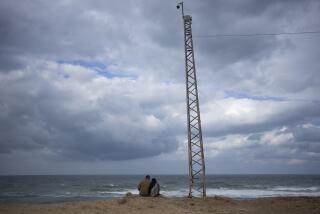Only a fraction of foreign aid after Katrina was used
WASHINGTON — As the wind and water of Hurricane Katrina were receding, presidential confidante Karen Hughes sent a cable from her State Department office to U.S. ambassadors worldwide.
Called “Echo-Chamber Message” -- a public relations term for talking points designed to be repeated again and again -- the Sept. 7, 2005, directive was unmistakable: Assure the scores of countries that had pledged or donated aid at the height of the disaster that their largesse had provided Americans “practical help and moral support” and “highlight the concrete benefits hurricane victims are receiving.”
Many of the U.S. diplomats who received the message, however, were beginning to witness a more embarrassing reality. They knew the U.S. government was turning down many allies’ offers of people, supplies and expertise worth untold millions of dollars. Eventually, the United States also would fail to collect most of the outpouring of international cash assistance for Katrina’s victims.
Allies offered $854 million in cash and oil that was to be sold for cash. But only $40 million has been used so far for disaster victims or reconstruction, according to U.S. officials and contractors. Most of the aid went uncollected, including $400 million worth of oil. Some offers were withdrawn or redirected to private groups such as the Red Cross. The rest has been delayed by red tape and bureaucratic limits on how it can be spent.
In addition, valuable supplies and services -- cellphone systems, medicine, cruise ships -- were delayed or declined because the government could not handle them. In some cases, supplies were wasted.
The struggle to apply foreign aid after the hurricane is another reminder of the federal government’s difficulty leading the recovery. Reports of government waste and delays or denials of assistance have surfaced repeatedly since hurricanes Katrina and Rita struck in 2005.
Administration officials acknowledged in February 2006 that they were ill-prepared to coordinate and distribute foreign aid and that only about half the $126 million received had been put to use. Now, 20 months after Katrina, newly released documents and interviews make clear the magnitude of the troubles.
More than 10,000 pages of cables, telegraphs and e-mails from U.S. diplomats around the globe -- released piecemeal since last fall under the Freedom of Information Act -- provide a fuller account of problems that, at times, mystified allies and left U.S. representatives at a loss for an explanation.
The documents were obtained by Citizens for Responsibility and Ethics in Washington, a public interest group, which provided them to the Washington Post.
In one exchange, State Department officials anguished over whether to tell Italy that its shipments of medicine, gauze and other medical supplies spoiled in the elements for weeks after Katrina’s landfall on Aug. 29, 2005, and were destroyed. “Tell them we blew it,” one disgusted official wrote. But she hedged: “The flip side is just to dispose of it and not come clean. I could be persuaded.”
In another instance, the Department of Homeland Security accepted an offer from Greece on Sept. 3, 2005, to dispatch two cruise ships that could be used free as hotels or hospitals for displaced residents. The deal was rescinded Sept. 15 after it became clear a ship would not arrive before Oct. 10. The U.S. eventually paid $249 million to use Carnival Cruise Lines vessels.
And while television sets worldwide showed images of New Orleans residents begging to be rescued from rooftops as floodwaters rose, U.S. officials turned down numerous offers of allied troops and search-and-rescue teams.
Overall, the United States declined 54 of 77 recorded aid offers from three staunch allies: Canada, Britain and Israel, according to a 40-page State Department table of the offers that had been received as of January 2006.
“There is a lack of accountability in where the money comes in and where it goes,” said Melanie Sloan, executive director of the public interest group, which called for an investigation into the fate of foreign aid offers. She added: “It’s clear that they’re trying to hide their ineptitude, incompetence and malfeasance.”
State Department spokesman Tom Casey said that the U.S. government sincerely appreciated support from around the world.
Representatives of foreign countries declined to criticize the U.S. response to their aid offers, though some redirected their gifts.
Of $454 million in cash that was pledged by more than 150 countries and foreign organizations, only $126 million from 40 donors was received. The biggest gifts were from the United Arab Emirates, $100 million; China and Bahrain, $5 million each; South Korea, $3.8 million; and Taiwan, $2 million.
More to Read
Sign up for Essential California
The most important California stories and recommendations in your inbox every morning.
You may occasionally receive promotional content from the Los Angeles Times.










